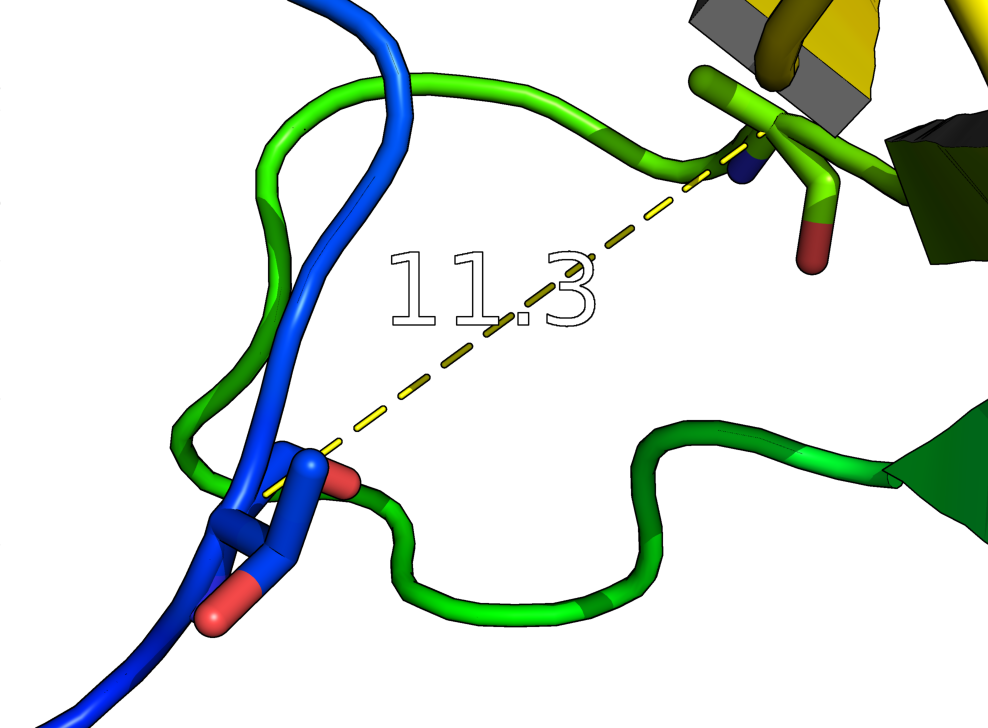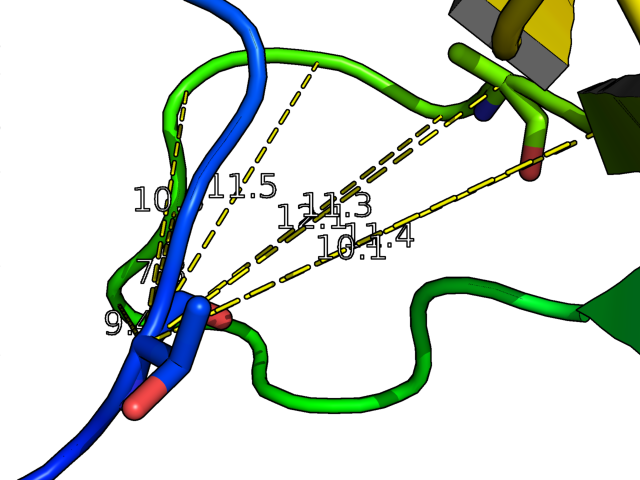Distance: Difference between revisions
Jump to navigation
Jump to search
No edit summary |
(mode=4) |
||
| (5 intermediate revisions by 2 users not shown) | |||
| Line 1: | Line 1: | ||
=Distance= | |||
{|- | |||
|| | |||
'''distance''' creates a new distance object between two selections. It will display all distances within the cutoff. [[Distance]] is also used to make hydrogen bonds. | '''distance''' creates a new distance object between two selections. It will display all distances within the cutoff. [[Distance]] is also used to make hydrogen bonds. | ||
Calling [[distance]] without arguments will show distances between selections (pk1) and (pk1), which can be set in editing mode or using the PkAt mouse action (usually CTRL-middle-click).<br><br> | |||
Note: For interactive use, the '''measurement''' [[wizard]] (from the PyMOL menu) makes measuring distances easier than using the [[distance]] command.<br> | |||
If you want to measure distance and avoid creating a distance object, use [[Get Distance]] or [[Distancetoatom]].<br> | |||
| | |||
[[Image:Dist ex1.png|300px|Example of distance. See example #1.]] | |||
| | |||
[[Image:Dist ex2.png|300px|Example of distance. See example #2.]] | |||
|| | |||
|} | |||
=Usage= | =Usage= | ||
<source lang="python"> | <source lang="python"> | ||
distance name | distance [ name [, selection1 [, selection2 [, cutoff [, mode ]]]]] | ||
</source> | </source> | ||
'''name''' | '''name''' | ||
::string: name of the distance object to create | ::string: name of the distance object to create | ||
| Line 22: | Line 27: | ||
'''mode''' | '''mode''' | ||
::0: all interatomic distances | ::0: all interatomic distances | ||
::1: only bond distances | ::1: only bond distances | ||
::2: only show polar contact distances | ::2: only show polar contact distances | ||
::3: like mode=0, but use [[distance_exclusion]] setting | |||
::4: distance between centroids (''new in 1.8.2'') | |||
=PYMOL API= | =PYMOL API= | ||
<source lang="python"> | <source lang="python"> | ||
cmd.distance( string name, string selection1, string selection2, | cmd.distance( string name, string selection1, string selection2, | ||
float cutoff, int mode ) | |||
# returns the average distance between all atoms/frames | # returns the average distance between all atoms/frames | ||
</source> | </source> | ||
| Line 51: | Line 57: | ||
* This neat example shows how to create distance measurements from an atom in a molecule to all other atoms in the molecule (since PyMol supports wildcards). | * This neat example shows how to create distance measurements from an atom in a molecule to all other atoms in the molecule (since PyMol supports wildcards). | ||
<source lang="python"> | <source lang="python"> | ||
cmd. | cmd.distance("(/mol1///1/C)","(/mol1///2/C*)") | ||
</source> | </source> | ||
or written without the PyMolScript code, | or written without the PyMolScript code, | ||
| Line 59: | Line 65: | ||
for at1 in cmd.index("resi 10"): \ | for at1 in cmd.index("resi 10"): \ | ||
for at2 in cmd.index("resi 11"): \ | for at2 in cmd.index("resi 11"): \ | ||
cmd. | cmd.distance(None, "%s`%d"%at1, "%s`%d"%at2) | ||
</source> | </source> | ||
| Line 73: | Line 79: | ||
=See Also= | =See Also= | ||
[[Measure_Distance]] | * [[Get Distance]] # Avoid creating an object | ||
[[Lines]] | * [[Distancetoatom]] # Automated script for distances to a point | ||
* [[Measure_Distance]] # basic script | |||
* [[Lines]] | |||
[[Category:Commands|Distance]] | [[Category:Commands|Distance]] | ||
Latest revision as of 14:37, 10 March 2016
Distance
|
distance creates a new distance object between two selections. It will display all distances within the cutoff. Distance is also used to make hydrogen bonds.
Calling distance without arguments will show distances between selections (pk1) and (pk1), which can be set in editing mode or using the PkAt mouse action (usually CTRL-middle-click). |
Usage
distance [ name [, selection1 [, selection2 [, cutoff [, mode ]]]]]
name
- string: name of the distance object to create
selection1
- string: first atom selection
selection2
- string: second atom selection
cutoff
- float: longest distance to show
mode
- 0: all interatomic distances
- 1: only bond distances
- 2: only show polar contact distances
- 3: like mode=0, but use distance_exclusion setting
- 4: distance between centroids (new in 1.8.2)
PYMOL API
cmd.distance( string name, string selection1, string selection2,
float cutoff, int mode )
# returns the average distance between all atoms/frames
EXAMPLES
- Get and show the distance from residue 10's alpha carbon to residue 40's alpha carbon in 1ESR:
# make the first residue 0.
zero_residues 1esr, 0
distance i. 10 and n . CA, i. 40 and n. CA
- Get and show the distance from residue 10's alpha carbon to residue 35-42's alpha carbon in 1ESR:
# make the first residue 0.
zero_residues 1esr, 0
distance i. 10 and n . CA, i. 35-42 and n. CA
- This neat example shows how to create distance measurements from an atom in a molecule to all other atoms in the molecule (since PyMol supports wildcards).
cmd.distance("(/mol1///1/C)","(/mol1///2/C*)")
or written without the PyMolScript code,
dist /mol1///1/C, /mol1///2/C*
- Create multiple distance objects
for at1 in cmd.index("resi 10"): \
for at2 in cmd.index("resi 11"): \
cmd.distance(None, "%s`%d"%at1, "%s`%d"%at2)
distance (selection1), (selection2)
# example
dist i. 158 and n. CA, i. 160 and n. CA
distance mydist, 14/CA, 29/CA
distance hbonds, all, all, 3.2, mode=2
See Also
- Get Distance # Avoid creating an object
- Distancetoatom # Automated script for distances to a point
- Measure_Distance # basic script
- Lines

